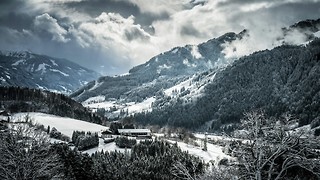Literature: Notes
Thea Hawlin plunges into a beautifully watery edition of the student publication.
Water seeps through this eighth issue of Notes. Maybe it’s the weather permeating the creative minds, or simply the editors sick of repetitive sleet. It comes in just as many forms as it can, from a subtle ‘reflexion’ in Cordelia Jackson’s lingering Echo, to the ‘television static of the sea’ that haunts Natasha Marchant’s The Beach. Her succinct sentences artful, ‘The single word, after so long a silence, feels like a raincloud’, also drenched with imagery. Venice, the city of water itself, features in Laurie Lewis’s engaging essay on Titian and his influences, a read that provokes a lot of rewarding internet searches, (my browser history now looks very impressive). His language when approaching art is finely fashioned, the reference to ‘undulating hills’ hard to forget.
Issac Nowell asks us to, ‘hear the water and believe in it’ in his poem, and sound is one of Nowell’s strong points. A clever uses of rhyme and assonance drawing the lines in and out of each other, drawing us on with artful repetition to the ‘sand’ of dry land. Tom White’s poetry continues to be a cryptic artwork unto itself, riddled with the symbols cleverly used to renegotiate meaning, it both frustrates and entrances, his playful attitude towards form and language in general is refreshing, if a little hard to comprehend.
Felix Bazalgette’s story The Attendant and I is particularly potent, a contemplation of war wrought with cunning details, the body of a man seen abruptly as ‘a collection of hinges’, it has an arching shape that pulls the reader in and then softly but surely spits them back out again, with all the power that a true short story should do. Most of the slightly shorter works of prose struggled in this respect, appearing as rather beautiful but achingly unfinished vignettes. Serena Candelaria’s two short prose works are a perfect example, where the philosophical self-reflexive struggle of On Writing is almost swallowed by its own contemplations; the concept is intriguing but somehow cut short.
The following Ascent and Descent is better, the briefness of the interaction beautiful, I just wish that of both tales there had been more: maybe I’m just being greedy. Evie Cassandra Ioannidi’s short piece on wanting to be a washing machine is touching in a similarly fleeting fashion, sinister undertones of sexual repression and the identity of women,(‘that’s no job for a woman’) poignant and approached in an interesting way via tainted innocence. Something as playful and comic as a desire to be a washing machine slowly transformed into a sinister commentary on gender politics.
The meeting depicted in Taste in Women by Conchita Sanchez is all too familiar with the scenario of new conversation, ‘To break silence, they talked about the weather’ constructed with juxtaposing ‘chalice lips’, to create a scene of comforting beer laden brevity. Claire Steep’s insightful essay into Tolkien’s lesser known Silmarillion provokes an exploration into the development of Tolkien’s mythology and his various influences, a truly interesting endeavour and a subject that deserves to be unearthed further.
The artwork in this issue is particularly pleasing. Jeremy Boydell’s gorgeous collage and some suitable sea snaps by Alice Fiennes buffer the tales, along with some striking shots by Emily Taylor and Emma Lawson as the issue draws to a close. Nick Marsh closes the issue in his Scene from an Interior with a ‘finer water’, suitable for a collection that is seeped with a concern or perhaps a subconscious yearning for water, a deep and resounding plea perhaps for this Lent term rain to finally go away...
 News / Cambridge scholarship recipient trapped in Gaza21 July 2025
News / Cambridge scholarship recipient trapped in Gaza21 July 2025 News / Chancellorship candidates express concern about conduct of election 19 July 2025
News / Chancellorship candidates express concern about conduct of election 19 July 2025 News / News in Brief: Chaucer, coffee-houses, and challenging degrees20 July 2025
News / News in Brief: Chaucer, coffee-houses, and challenging degrees20 July 2025 News / Write for Varsity this Michaelmas13 July 2025
News / Write for Varsity this Michaelmas13 July 2025 News / Trinity exam burglar jailed for 11 months18 July 2025
News / Trinity exam burglar jailed for 11 months18 July 2025







